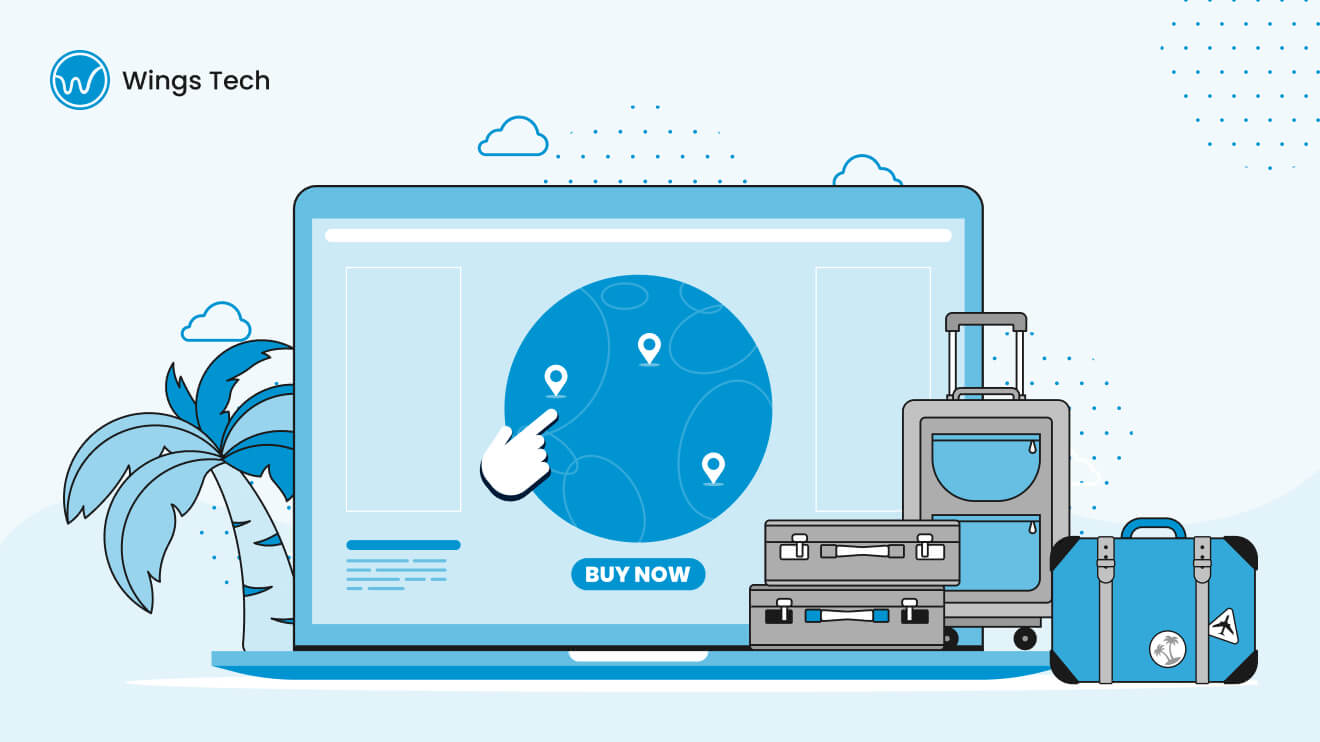Table of Contents
Travel website development in 2025 will be beyond nice pictures of different places. Modern travel websites are a technologically advanced combination of coding, design, ethics, and business psychology principles. Your website’s font, call-to-action button color, and page loading speed are all deciding factors by which your users judge your business before they book a trip.
The tourism industry has evolved from AI learning what you like from your Chrome history to VR tours that nearly get you to forget that you are broke.
Your travel website experience must be an experience itself, mobile optimized, and must load quickly. If your website is not able to do these, you may not have a website, it’s a digital brochure. This blog describes in-depth travel website development, processes, cost & more. The below takeaways may shift the way you think.
What is Travel Website Development?
Travel website development is usually organized into different kinds of categories addressing distinct needs. Tour operator sites are travel experience-oriented, arranging and conducting tours for individuals or groups. Travel agencies are web intermediaries, providing services like flights, accommodation, car hire, and other travel facilities; all these are packaged into one unit, which is called an itinerary.
Hotel booking websites allow users to search for accommodations by criteria such as availability, price, location, and even user ratings, and offer booking options. Flights aggregators or metasearch engines are specialized travel industry websites. They can check fares from different airline companies as well as other ticket-selling agencies and provide price comparison from all travel service providers in one place, instead of digging through multiple Chrome tabs.
Every type of travel website has its specific user experience, backend architecture, and data system design.
Why do you need a Travel Website?
A travel website is needed more than ever and is a necessity for any modern business. Here’s why you need a well-executed travel website development for your business:
24/7 accessibility and bookings
What is not directly accessible is skipped today. Where nearly 65% of bookings are done online today, your website should be constantly updated and available to your audience, which translates to more bookings and revenue.
Direct customer engagement and marketing
80% of online travelers consult an online travel agency before booking a trip. This means your travel website can be a direct line to your customers. Travel agency websites today deploy various types of newsletters, chatbots, and offers that trigger the curiosity of travellers and ultimately convert them into travelers.
An advantage over offline sales models
74% of global travel revenue will come from online channels by 2027. In such scenarios, businesses without a good travel website will fall behind. Offline sales are important, but staying visible online is also equally important, if not more.
To thrive business-wise in the coming years, a travel website is the backbone for your modern travel business.
Want to take your travel business online?
Process of Travel Website Development
To know the ‘Why’ behind a travel website is the most important step before travel website development. More than 60% of travelers prefer to book their trips online, and knowing the business goals, audience for the marketing campaign, and the value proposition is essential for building a loyal customer base online. Various competitors’ analysis, functionalities, and market trends are researched to shape the site’s contextual structure and marketing strategy.
Wireframing & UI/UX Design
First, the designers create wireframes and prototypes to map out the travel website’s structural flow. Custom UI/UX design plays a big role in creating a visually appealing website interface. An accessible interface means customers can easily search, compare, and book their trips, which impacts conversion rates. A clunky design confuses users, which means poor user experience and poor business performance.
Development with core functionalities
Developers now build the front-end and the back-end of the website. They integrate booking engines, secure payment gateways, and third-party APIs for things like flights and hotels. Travel-related ecommerce revenue has grown to $800 billion in 2024, and will grow even more in 2025. And your website should have these flawless functionalities working to drive revenue to your business.
Testing & deployment
A delay of even 1 second can reduce conversions by 7% and customer satisfaction by 16%. Functionality, speed, and mobile responsiveness should be tested rigorously before launching the website to ensure that everything works and that the site can handle high traffic volumes without crashing.
Maintenance & updates
If your website isn’t updated and isn’t compatible with new devices and browsers, it will remain behind the majority of your competitors. Continually applying security fixes, updating broken links, and ensuring site compatibility is a big step for maintaining your online presence.
Technologies for Developing Travel Websites
All the major players today are focusing on building online sales models which work in an automated way, rather than focusing on building travel agencies the traditional way. What stands out with the major players is intuitive websites built with different technologies. Here’s how you can choose your technology:
Front-end technologies
Front-end technologies, as the name suggests, power the look and feel of a travel website. HTML and CSS are the backbone, but when users need something more than static brochure pages, JavaScript frameworks like React, Angular, and Vue.js are used. For dynamic content, real-time updates, and interactive features. Travel agencies often get their websites developed in these front-end technologies.
Back-end technologies
If the front-end works well, so should the backend. Technologies like Node.js, PHP, Python, and Ruby on Rails are technologies that make a backend engine run smoothly. For functionalities like real-time booking requests and user authentication, Node.js helps scale these functionalities.
Database solutions to manage travel agency data
Data storage is important as it handles everything from user profiles to booking histories. Relational databases like MySQL and PostgreSQL are ideal for structured data. MongoDB is a flexible database that can help maintain and store dynamic travel content.
API and integration in a travel website
A modern travel website without comparison algorithms and travel booking APIs is as good as a brochure, which is easily ignored. Today, users need pricing and flight availability accessible within a click, which is done by APIs like Amadeus and Sabre. Payment gateways like Stripe and PayPal provide payment options from any location. If you are a user searching for a flight to LA from Greece, Google Maps and Geolocation APIs make it possible for you to view personalized location-based services.
The technologies powering travel websites aren’t just tools. They are what make a booking experience interesting and quick for the modern traveler today.
What are the key features of a travel website?
Let’s have a look at some essential features every travel website in 2025 should have:
1. User-friendly interface + responsive design
The majority of travel bookings happen on mobile devices with a responsive interface for users. For example, Booking.com is a standout example of a clean and adaptive design. Its interface works flawlessly across all devices. Users can search and book on the go.
2. Advanced search & filters (Location, Price, Dates, Ratings)
If users have to find prices, dates, locations, and ratings in 20 different tabs, despite being on your travel website, your website is already a failure. A website like Expedia, which provides advanced search filters like location, price, dates, and ratings, helps users quickly make their choice and narrow down choices.
3. Booking & payment integration
If a website’s payment gateway takes 20 minutes to load, a user will immediately have trust issues related to your website. Platforms like WeTravel and Booking.com have good gateways like PayPal, Stripe, and PayU Money integrated, which are good options for catering to a global audience.
4. Personalized user accounts & wishlists
To have a loyal customer base, it’s necessary to offer personalized services to them. Websites like Airbnb are a great example of personalization. It allows customers to save favorite locations, favorite Airbnb’s, and wishlists. This makes their planning more convenient and tailored.
5. AI-Powered chatbots for customer support
Where humans fail, AI chatbots are never late. Today, websites like TravelPerk and Expedia use chatbots to enhance customer service. The wait times are significantly reduced, which results in more satisfied customers.
6. Reviews & testimonial section
TripAdvisor and booking.com show verified user reviews. These kinds of verified user reviews make your platform incredibly trustworthy. These reviews can help you capitalize on them and drive revenue to your business.
7. SEO-Optimized blog section
Travel content marketing plays a huge role in generating organic traffic and educating travelers. The travel blogs help visualize journeys and influence travelers to book trips within a short amount of time. Lonely Planet and Expedia’s blog pages are the best examples; they offer destination guides, travel tips, and stories that are interesting and continually interesting to visitors.
Build a Travel Website That Converts
Best practices for travel website development
The look and feel of a travel website is important, but so is performance. Travel websites that convert visitors have the following features:
1. SEO optimized travel website
An SEO-optimized travel website is crucial because if your site isn’t ranking in the top 10 search results, travelers simply won’t find you. You’ll need a clean site structure, XML sitemaps, and schema markup to communicate effectively with search engines. Beyond that, consistently publishing content that both captures human curiosity and satisfies search engine algorithms is your best strategy for strong SEO.
2. Fast loading speed
Fast loading speed isn’t just a nice-to-have; it’s essential to capture user attention today. Even a one-second delay can cut your conversions by 7%. To ensure your homepage loads quicker and smarter, vital elements like CDNs (Content Delivery Networks), compressed images, and browser caching are not just technical terms, they are fundamental necessities.
3. Mobile responsiveness
If your websites fumble on small screens, you are practically rejecting half the market. Tap-friendly buttons, responsive layouts, and simplified navigation are not just design trends; they are mandatory for company responsiveness.
4. Security & data protection
SSL and GDPR compliance are not just checkboxes to be ticked, but they are vital trust builders. Payment integrations should also come from trusted providers like PayPal or Stripe.
5. Social media integration
Platforms like Instagram and Facebook become your best free digital storefronts. Take the help of user-generated content and shareable media, which helps in engaging as well as bringing customers to your website.
How much does Travel Website Development Cost?
Pricing in travel website development is a negotiation between your ambitious expectations and your site’s architecture. A site listing destinations will not cost the same as a flight aggregator site that compares flight booking.
Complexity of features
Every feature you add to your travel site, like chatbots, search filters, or payment gateways, increases its development cost. Simply put, more functionality means a higher price.
Design philosophy
Template-based designs are great, but they are nothing special if your strategy is to look like everyone else. Custom websites, on the other hand, can be scaled distinctively and as per requirements. This kind of custom design philosophy can cost between $2000 and $10000.
Third-Party integrations
Want Expedia’s listings or Amadeus’s inventory? These APIs are pretty expensive to come by. Licensing and development time for these features can raise your final bill to $25000+.
Estimated spend
- Basic travel site: $3,000 – $8,000
- Custom portal: $10,000 – $50,000+
- Monthly upkeep: $500 – $2,000
Know Your Budget. We’ll Build Around It.
Travel Web Design Trends in 2025
Travel web design in 2025 is a round trip to first-class designs. Beyond banners and slideshow carousels, today’s web design trends are intelligent, sensory, and built for a wide attention span.
AI-powered personalization
Modern travel platforms are going for algorithmic discipline rather than guessing what their users like. Tools like ChatGPT and Inspirock can now interpret past searches, bookings, and recommend itineraries.
Voice search & booking
Travelers now command bookings with voice-enabled Alexa. Expedia also does not wait for its users to type; rather, it facilitates bookings without involving a keyboard.
Augmented Reality (AR) tours
Why imagine a place when you can pre-walk your destination in AR? Sites like TravelMap use immersive and interactive visuals to help travelers see before they commit to a trip or a package.
Minimal interfaces & dark mode
Less is more in 2025, even with travel website development. Platforms like booking.com leave the digital baggage out the door with cleaner layouts and dark mode options, which is easier on the eyes for users.
Blockchain payments
Blockchain offers decentralized gateways to promise safe and trackable transactions. No more do your users have to worry about credit card portals that look suspicious.
How Wings Tech Can Help You Develop a Travel Website
Wings Tech is in the business of customized websites, with over 14+ years in custom travel website development. We create digital websites that are engaging and convert visitors.
Expertise in custom travel website development
Our methodology goes beyond fitting features into rigid molds. Whether you’re a tour operator, a travel agent, a hotel chain, or more, we create UX architecture to back-end logic for your desired roadmap.
API & booking system integrations that work
Our developers are experts and do not find Amadeus, Sabre, and Expedia integrations hard. We build travel systems with real-time inventory and dynamic pricing. Your customers do not have to worry about the maybe button at the end of the checkout process.
Built for Speed & Search Engines
Every Wings Tech travel website is responsive and SEO optimized. With Schema markups and technical SEO integrated into the website backend, we ensure 100% visibility of your website.
Transparent Pricing with Scalable Development
We offer flexible plans and honest estimates for your travel website development. Whether it’s a simple portal or a robust enterprise platform, you can get exactly what you pay for.
Build a Travel Website that sells the journey before the ticket
Your website today is a digital storefront, and it is your first handshake, even before your customers meet you and book a flight or a trip. Travelers in 2025 do not like bare minimum, they need quick services with speed and personalization integrated. A website that does not waste time and is proactive in giving its customers what they want.
This holds for all agency types, boutique-sized travel agencies and large agencies: having a well-functioning travel website is the best asset that any travel agency can possess.
Smart design trends, AI-powered travel personalization interfaces, safe booking interfaces for their customers to interact with, coupled with lightning-fast performance. Designing a traveling website in 2025 takes art and engineering to increase conversion rates. Let Wings Tech be your guide for travel website development in 2025.








